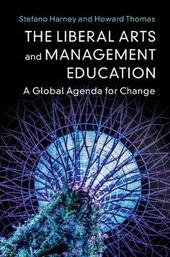
|
The Liberal Arts and Management Education: A Global Agenda for Change
Hardback
Main Details
| Title |
The Liberal Arts and Management Education: A Global Agenda for Change
|
| Authors and Contributors |
By (author) Stefano Harney
|
|
By (author) Howard Thomas
|
| Physical Properties |
| Format:Hardback | | Pages:238 | | Dimensions(mm): Height 235,Width 157 |
|
| Category/Genre | Business ethics
Management and management techniques |
|---|
| ISBN/Barcode |
9781108473156
|
| Classifications | Dewey:650.0711 |
|---|
| Audience | | Professional & Vocational | |
|---|
| Illustrations |
Worked examples or Exercises
|
|
Publishing Details |
| Publisher |
Cambridge University Press
|
| Imprint |
Cambridge University Press
|
| Publication Date |
30 January 2020 |
| Publication Country |
United Kingdom
|
Description
Calling for the transformation of undergraduate education, Thomas and Harney argue that the liberal arts should be integrated into the traditional management curriculum to blend technical and analytic acumen with creativity, critical thinking, and ethical intelligence. In describing their vision for a new liberal management education, the authors demonstrate how a holistic pedagogy that does not sacrifice one wealth of learning for another instead encourages participation and integration to the benefit of students and society. Global in sweep, the book provides case studies of successfully implemented experimental courses in Asia and Britain, as well as a speculative chapter on how an African liberal management education could take shape, based on African-centred principles and histories. Finally, the book argues that the stakes of this agenda go beyond mere curricular reform and pedagogical innovation and speak directly to the environmental, business, political, and social challenges we face today.
Author Biography
Howard Thomas is Professor Emeritus of Strategic Management and Management Education at Singapore Management University, and the Ahmass Fakahany Distinguished Visiting Professor of Global Leadership at the Questrom School of Business, Boston University. He is a highly cited scholar, with fellowship awards from the US Academy of Management, the British Academy of Management, the Strategic Management Society, the Academy of Social Sciences, and the Institute of Directors. He was also awarded the Richard Whipp Lifetime Achievement Award of the British Academy of Management in 2013, and the Strategic Leadership Award from the Association of Collegiate Schools of Business International (AACSB) in 2014. Stefano Harney is Honorary Professor in the Institute of Gender, Race, Sexuality, and Social Justice at the University of British Columbia. He is also a Visiting Critic at Yale University Art School, and a Professor at the European Graduate School. He is co-author of The Undercommons: Fugitive Planning and Black Study (with Fred Moten, 2013). He runs the reading camp and art project Ground Provisions with Tonika Sealy Thompson. He co-founded School for Study a nomadic collective of university teachers experimenting with co-teaching.
Reviews'Anemic global growth, severe income disparity and ethical breaches have cast concern that management education models are flawed. In this provocative book, Thomas and Harney convincingly argue that the main issue is the lack of integration of the liberal arts into management curricula. They call for a rethinking, not only of business education but of how universities structure their curricula in all areas. This book should be required reading for all academics; it will undoubtedly change the way faculty think about educating the next generation of leaders.' Andrew J. Policano, Professor Emeritus, The University of California, Irvine 'A major contribution for the reinvention of business schools, and higher education at large, by two of the most prominent experts in the sector.This book centers the future debate for the mission of business educators and the essence of management science.' Santiago Iniguez de Onzono, President, IE University, Madrid '... an innovative pedagogy and perhaps a new appreciation for the relationship between the liberal arts and management degree curricula that integrates the ever-increasing need for professional skills with the historical role of the college experience. This new approach will ensure that baccalaureate graduates, whatever their discipline, are prepared not only for the specialized demands of their professional careers but also for the demands of global leadership.' S. R. Kahn, Choice
|